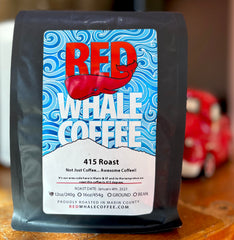5 Reasons to Drink Direct Trade Coffee August 20, 2014
Coffee is one of the largest traded commodities in the world, spanning oceans, continents, and countries. With coffee traveling such distances to reach your cup, its easy to lose sight of where it started; the people who work long hours cultivating and growing the coffee that eventually become the beans that you consume. Unfortunately, losing sight of the coffee journey, makes it is easy for the people and the environment to become exploited. As a socially conscious coffee drinker, how do you support those producers in a positive and sustainable way? One answer is Direct Trade coffee!
Graciano Cruz (Producer, shown left) & Sean Boyd (Roaster, shown right)- Los Lajones Estate http://www.loslajonesestate.com/eng/farmer/
Here are five reasons to consider coffee that was bought through direct trade-
1. You know who handles your coffee
Direct Trade means that the roaster builds a relationship with the coffee producer, there is no middle man. By buying a direct trade cup of coffee, you support the small growers who put care and their livelihood into the quality of your coffee. With direct trade, the farmers are not just some shadow, the chain of hands that handle your coffee is more intimate, the miles between the consumer and the producer does not mean there is a distance between the people.

2. You combat the industrial complex that many coffee certifications have developed.
On paper, Fair Trade Coffee is a great idea. It was developed to promote fair wages and positive living conditions for producers. When a producer is Fair Trade certified, they become part of a coffee cooperative that advocates for them and in return they receive a percentage of the coffee price. The money the cooperative collects is meant to help the communities around the coffee producers. Fair Trade has a minimum pricing structure, meant to guarantee a fair living wage for the producers and their workers. Unfortunately, Fair Trade has grown to encompass more administration between the coffee producers and the buyers, resulting in more money going to those working for the Fair Trade business, rather than going to the producer. Supporting Direct Trade cuts out the middlemen and the Fair Trade cooperatives that may discriminate against certain producers who cannot afford the requirements.

3. Quality of your coffee grows.
The nature of Direct Trade creates a dialogue between the producer and the buyer. With that communication comes feedback. Buyers communicate how coffee is roasted and served allowing the producer to understand what the finished product of their labor becomes. The producer learns which cherries produce a better cup of coffee and which beans did not turn out as well. With this roaster/producer dialogue, each harvest has the potential to be better than the last. When a producer becomes aware of the end product, they develop a pride in their labor, which leads to care. Each step is not a disjointed system. The premium for Direct Trade coffee, driven by buying demand, is higher than the minimum Fair Trade pricing structure. With Direct Traded coffee, the demand drives the price drives which in turn creates incentives to improve the quality in the coffee.
4. The global community grows.
The basis of Direct Trade is mutual respect and trust. Rather than trusting a third party to guarantee standards, a relationship grows between people from completely different countries. Through respect for the product, producer and buyer work to improve on both ends. The communication and relationships grow over time, guaranteeing quality but also, keeping business between people and bridging gaps between culture and industry.

5. Your coffee is sustainable.
The nature of Direct Trade promotes long term relationships. The producers can depend on their buyers to support their coffee at a price that allows their families to thrive and communities to grow. Direct Trade is dynamic, allowing producers to remain on the cutting edge of what demands are growing for their coffee. It also allows for farms to invest in sustainable methods that are better for the environment and the communities.
Come down to Red Whale Coffee and check out our Direct Trade Coffee! Learn about the producers who grow your coffee and sip the history of your coffee beans. Your relationship with Red Whale Coffee makes you part of the direct trade chain and supports the relationship with the producers from countries far away. How exciting is that?!
Stay tuned for blogged highlights of the producers who grow our coffee for you!
Written by Caitlyn Prien




